|
|
|
Sort Order |
|
|
|
Items / Page
|
|
|
|
|
|
|
| Srl | Item |
| 1 |
ID:
172134
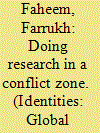

|
|
|
|
|
| Summary/Abstract |
This paper argues that in conflict zones like Jammu and Kashmir, the embodied stories of Kashmiris punctuate the past, often silenced by dominant Indian narratives. Narratives about certain key political events in the region's past co-exist with other forms of memory. Kashmiris weave these stories to make sense of the present, build connections to the past, and stake claims for the future. They build and nourish an archive based on lived experience, keeping a record of past wrongs. Novels, anecdotes and underground literature form part of this embodied archive, and provide a resource for recovering stories that remain silent in institutional archives which serve the interests of power. These interests are visible through restrictions on access to institutional archives, and demonstrate the effects of power and the overall politics of archives.
|
|
|
|
|
|
|
|
|
|
|
|
|
|
|
|
| 2 |
ID:
152965


|
|
|
|
|
| Summary/Abstract |
In the recent era of state formation in Afghanistan, hundreds of small popular movements rebelled against the Taliban throughout the country. One in particular stands out – the Andar Uprising in the spring of 2012 gave a compelling case of local vigilantism in an area ripe with historic grievances and narratives of community defense dating back to the anti-Soviet jihad. This case is compelling as it shows one faction of the movement engaging in protective paramilitary behavior over the civilian population, while the other faction engages in predatory behavior. Controlling processes, incentives structures, and narratives were all factors correlating to the rise of a popular anti-Taliban resistance in Andar District that battled the Taliban and perceived oppression in their district. When patrons and the community engaged in complementary governance over the paramilitary group, in this case through the Afghan Local Police (ALP), paramilitary behavior was protective of the civilian population. However, when patrons and communities failed to provide complementary governance, as the case of the remaining Uprising force after ALP institutionalization, the paramilitaries engaged in predation on the local population.
|
|
|
|
|
|
|
|
|
|
|
|
|
|
|
|
| 3 |
ID:
192291
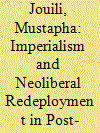

|
|
|
|
|
| Summary/Abstract |
Since the early 1970s, neoliberalism has not spared Tunisia’s subordinate integration into the global capitalist system. This process strengthened a dominant ruling class, closely connected to international capital interests, while leading to growing social polarization and rising socio-economic inequalities. Faced by popular resistance, authoritarianism, with the support of imperialist powers, became the needed political response to consolidate the neoliberal project. Beyond some democratic achievements, the 2011 uprising has failed to undo the development model at work. The imperialist powers, with the complicity of the ruling classes, were able to hijack the movement and direct it towards what I call an orderly transition, whose strategies entailed the use of financial aid and military assistance.
|
|
|
|
|
|
|
|
|
|
|
|
|
|
|
|
| 4 |
ID:
188233
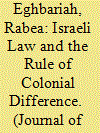

|
|
|
|
|
| Summary/Abstract |
Israeli law is an important medium that maintains, perfects, and facilitates the fragmentation of Palestinians. Israeli citizenship figures in this structure of fragmentation as an exceptionalizing legal status that blurs “colonial difference” between Palestinian citizens in Israel and Jewish Israelis. The May 2021 uprising and its aftermath not only highlighted the counter-fragmentary forces present among Palestinians across different legal statuses, it also brought into clearer view a rule of “colonial difference” that crisscrosses the Israeli legal system and pertains to all Palestinians under its control. This essay explores the concept of “colonial difference” as applied to Palestinians through the law, and how this rule has been employed in the context of the May 2021 uprising against Palestinian citizens in particular.
|
|
|
|
|
|
|
|
|
|
|
|
|
|
|
|
| 5 |
ID:
163814
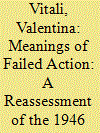

|
|
|
|
|
| Summary/Abstract |
The exhibition, Meanings of Failed Action: Insurrection 1946, opened in Mumbai on 17 March 2017, and then in New Delhi on 8 February 2018. The second part of Vivan Sundaram's ‘The History Project’,1 this new installation was intended to mark seventy years of Indian Independence and Partition by exploring an often forgotten moment of Indian history: the uprising of the Royal Indian Navy's ratings in February 1946, when 10,000 naval ratings took charge of 66 ships across the Indian subcontinent in the name of the ‘Quit India’ movement. The event has since been erased from Indian national history, perhaps because, had the insurrection succeeded, India's struggle for freedom might have taken a different turn. In what follows, I focus on the documents we unearthed while researching for the exhibition—pamphlets, slogans, the ratings’ statements to the police and to the Commission of Enquiry, their memories and prison letters—and examine the motivations and hopes that defined the strikers’ action. What kind of freedom did the ratings stand for?
|
|
|
|
|
|
|
|
|
|
|
|
|
|
|
|
| 6 |
ID:
154791
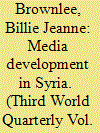

|
|
|
|
|
| Summary/Abstract |
This article intends to provide responses to some of the many unanswered questions about the making and the transformation of the uprising in Syria by exploring a new avenue of research: media development aid. Most academic interest has been oriented towards the role that the new media played at the time of the uprising; insufficient interest, by contrast, has been directed to the development of the sector in the years predating it. What emerges from this article is that the Syrian media landscape was strongly supported by international development aid during the years prior to the outbreak of the uprising of 2011. By looking at the complex structure of media aid architecture and investigating the practices and programmes implemented by some representative organisations, this article reflects on the field of media development as a new modus operandi of the West (the EU and US especially), to promote democracy through alternative and non-collateral, bottom-up support.
|
|
|
|
|
|
|
|
|
|
|
|
|
|
|
|
| 7 |
ID:
123272
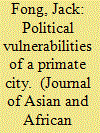

|
|
|
|
|
| Publication |
2013.
|
| Summary/Abstract |
Dynamics of the May 2010 'Red Shirts' uprising in Bangkok are examined through literature about the primate city, a city that is exponentially larger than a country's other cities. Employing news coverage of events, history about Bangkok's urban and political development, and analyses of class-based inequalities and nationalisms that the city harbors within its confines, attributes of primate city are expanded to include its perennially vulnerable political status. Such a rendering of the politically vulnerable primate city is employed to theorize how the primate city - when functioning as a national capital - is more than a large urban center, but one that collects much of the nation's hopes, dreams, and political struggles.
|
|
|
|
|
|
|
|
|
|
|
|
|
|
|
|
|
|
|
|
|